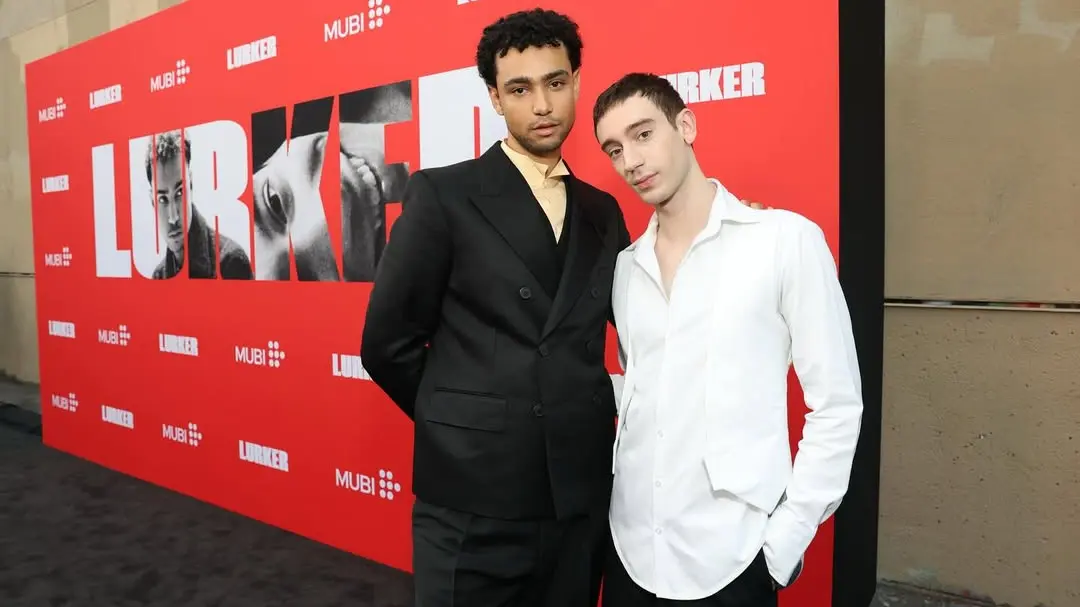What does Lurker’s ending reveal about Oliver and Matthew’s twisted relationship?
-
 Lurker L.A premiere via Instagram @lurkerhq
Lurker L.A premiere via Instagram @lurkerhqLurker showcases the relationship between a pop star (Oliver) and his fan, who becomes an extremist wholesaler (Matthew). It is a fever dream of the uncomfortable, ulterior energy and transparency that often emerge in relationships formed in the wake of fame, identity, and desire.
The impetus of the film, its startling time jump ending, parallels their dependency on each other's toxicity, and leaves audiences scratching their heads on who is feeding off the other. This is not a story of predator and prey; it is an eerie study of two human beings with deep psychological wounds feeding each other's hollowness.
The ending suggests neither escapes unscathed: Oliver gains clarity but loses his spark; Matthew gains status but remains tethered to Oliver’s shadow.
Lurker brims with homoerotic tension that is never completely resolved, utilising that queer theorist Eve Kosofsky Sedgwick calls a comparison of homosocial desire.
There are charged moments between Matthew and Oliver, a lingering gaze more than an instant during a group situation, wrestling that tiptoes toward intimacy, but their relationship is mostly unspoken signals that call them to a place of wanting while maintaining distance.
As Pellerin noted in a Variety interview,
“Matthew wants to be Oliver, but also to possess him—it’s love warped by envy.”
The dark mirror of Lurker: What the ending reveals
The film’s climax, a jarring leap to 2025, flips the script. Oliver, once a flamboyant pop icon, attends Matthew’s documentary premiere stripped of artifice—his hair natural, his demeanor grounded.
Matthew used to be a nobody, but now he's enjoying some minor celebrity because he is recognised on the street for his movie. It’s deeply ironic: Oliver is real and discards a pop-star identity because of Matthew’s obsessive involvement in his life, yet Matthew’s improvised celebrity arose from exploiting Oliver's life.
There is no victor, no victim; they have both re-defined each other and exchanged cynicism. As Russell explained to IndieWire,
"the end asks: did Matthew break Oliver, or did Oliver break free because of Matthew?"
It starts fairly innocently: a socially awkward retail worker, Matthew (Théodore Pellerin), gets to meet adventurous Oliver (Archie Madekwe), a leading musician about to break into something bigger, in a slick LA boutique in 2019.
From the onset, Matthew and Oliver find a connection that dazzles Matthew's concept of admiration and gives Oliver a thirst for attention. When Matthew discusses doing a documentary about shadowing Oliver, he soon becomes wrapped in an obsession with going as far as sabotaging Oliver's competitors and creating staged moments for the camera.
In the post-screening Q&A, Alex Russell (director) called their relationship "mutually haunted", a relationship where each man's foibles magnify the others.
Lurker: A mirror to our obsessions
Lurker resonates in a world where TikTok and X turn life into performance. Matthew's story, from anonymous fan to mini-celebrity, parallels how we yearn for validation through likes and follows. Oliver's complicity, feeding off Matthew's fixation, reveals the hollowness of fame absent self.
The film’s final shot, with Oliver watching Matthew’s documentary, feels like a warning: when identity hinges on another’s gaze, both sides lose something vital. As Madekwe said in a Screen Daily interview,
“Oliver’s journey is about realising he’s been a lurker in his own life, chasing a version of himself that doesn’t exist.”
Lurker is playing in select theatres and streaming on Mubi. Dive into this unsettling portrait of fame and fixation before it slips from the spotlight.
TOPICS: Lurker